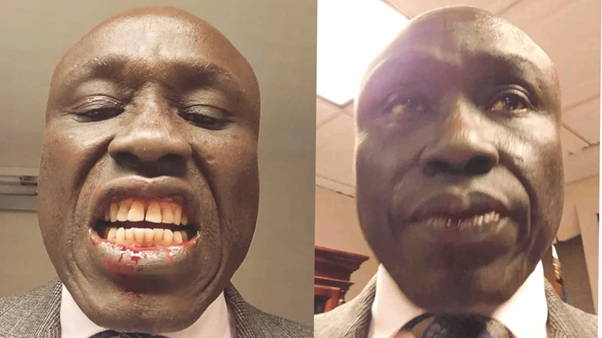JUBA – South Sudan’s ambassador to the United States, Santino Fardol W. Dicken, has accused the deputy head of mission, Angong Dhol Acuil, of physically assaulting him in his office at the embassy in Washington.
The ambassador described the incident, which occurred on November 25, 2024, as a “violent attack” and has reported the matter to local police.
Graphic images circulating on social media show the ambassador with blood around his mouth, allegedly resulting from injuries sustained during the altercation.
In a letter addressed to the ministry of foreign affairs and international cooperation in Juba, Fardol detailed the assault and characterized it as both a personal attack and an affront to the authority of the South Sudanese state.
He accused Ambassador Angong, who is the daughter of South Sudan’s minister of general education and foreign affairs, Awut Deng Achuil, of escalating tensions at the embassy through a pattern of misconduct and insubordination.
“I was violently attacked today, 25th of November 2024, injured and insulted by the Deputy Head of Mission, Ambassador Angong Dhol Acuil, within my office,” Fardol wrote in his letter obtained by Sudans Post.
“This behaviour is unacceptable, mainly because it targeted me in my capacity as the Special Envoy of the President and Head of Mission,” he added.
The ambassador also alleged that the incident followed months of unresolved issues involving the deputy head of mission.
He questioned why his prior reports of Acuil’s alleged absenteeism and unauthorized actions had been ignored by the ministry, emphasizing that her behavior had severely undermined the embassy’s operations.
“How can a diplomat be absent for 70 days, resume duties without reporting to the Head of Mission, and write unauthorized letters to foreign governments without the Head of Mission knowing the content?” he asked in his letter.
The ambassador accused Acuil of a broader pattern of disruptive behavior, stating that she had previously been involved in physical altercations with other diplomats, including Ambassador Gordon Buay, who was the charge de affairs at the mission, and had a history of abusive interactions with embassy staff.
“This pattern of misconduct is not new. Amb. Angong has previously exhibited similar behavior, including a physical altercation with Ambassador Gordon Buay and abuse of other Heads of Mission, diplomats, and local employees,” he wrote.
Fardol further alleged that after the attack, Acuil threatened local embassy staff, creating an atmosphere of fear. He called on the ministry of foreign affairs to collect statements from witnesses, including his executive secretary, drivers, and other embassy personnel, who he said observed the altercation and have already provided accounts to the police.
The ambassador, citing fears for his safety, stated that he could no longer work with the deputy.
“As my life is in danger, I must reiterate my position: I cannot and will not work with an immoral, violent, abusive, and unethical lady like Amb. Angong,” he said.
The incident has sparked widespread reactions online, with graphic images of Ambassador Fardol showing blood around his mouth circulating across social media platforms.
Many users have expressed outrage, calling for immediate action by South Sudan’s Ministry of Foreign Affairs.
Ambassador Fardol also raised concerns about the ministry’s failure to act on his previous reports, questioning why no measures were taken to address the issues he had repeatedly flagged since March 2024.
He described Acuil’s actions as a gross violation of diplomatic norms and a direct challenge to the authority of his office.
The ambassador’s accusations against Acuil come as a significant embarrassment to the Ministry of Foreign Affairs, which has not yet issued an official response to the allegations.
Observers say the involvement of Acuil’s mother, Awut Deng Achuil, as the country’s Minister of General Education and Foreign Affairs, complicates the matter and places additional pressure on the ministry to ensure impartiality in handling the case.
“I trust you will consider this matter seriously before I can take legal action against Amb. Angong Dhol Acuil, if necessary,” Fardol warned in his letter to the ministry.
The incident has reignited debates about professionalism and accountability within South Sudan’s diplomatic missions.
Critics have called on the ministry of foreign affairs to address the internal issues plaguing its embassies and to ensure the safety and dignity of its envoys, but the ministry has not yet commented on the incident. By Sudan's Post






